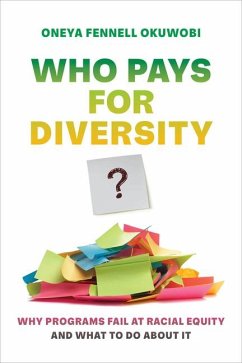"Oneya Fennell Okuwobi brilliantly uncovers the hidden costs of diversity initiatives, challenging the superficiality of such programs and the burdens they place on people of color within so-called 'diverse' environments with a powerful, evidence-backed critique. This book is an essential read for anyone committed to creating genuine racial equity in workplaces and institutions."--Mary Murphy, Herman B. Wells Endowed Professor, Indiana University "Who Pays for Diversity? is an unflinchingly honest account of the ways that companies, churches, and universities commodify people of color to advance their organizational interests. Okuwobi shows how white organizations use people of color as props for profit, to deflect from accusations of discrimination, or just to burnish their image. The stories in this book are wild--and all too recognizable--to any person of color who has spent a substantial amount of time in a predominantly white organization. Ripping the facade off organizational practices that purport to advance racial equity but actually ensure inequality, Okuwobi has crafted a book that will become required reading for everyone interested in creating lasting organizational change."--Victor Ray, F. Wendell Miller Associate Professor of Sociology at the University of Iowa and author of On Critical Race Theory: Why it Matters and Why You Should Care "With rich data from employees of color across multiple sectors, Okuwobi offers a vital contribution to the field of diversity studies that is a must-read for scholars and practitioners alike."--Sarah Mayorga, author of Urban Specters: The Everyday Harms of Racial Capitalism "Okuwobi's careful and detailed analysis reveals how organizational commitments to diversity, equity, and inclusion are hardly sufficient for achieving equity or justice. Indeed, Okuwobi demonstrates that absent any consideration for how DEI initiatives might further marginalize the very groups it purports to benefit, these efforts--be they community based, corporate funded, or university driven--can do more harm than good."--James M. Thomas, associate professor of sociology at the University of Mississippi, coeditor of Sociology of Race and Ethnicity, and author of Diversity Regimes and The Souls of Jewish Folk "Who Pays For Diversity? is as timely as it is prescient! In a moment of widespread disillusionment about diversity and inclusion, this critically important book offers a comparative study of employees of three major institutions--business, higher education, and religion. Okuwobi illuminates just who bears the burdens and reaps the rewards of diversity in the workplace and paves a path forward for creating a truly equitable and just world. A must-read!"--Korie Little Edwards, University Distinguished Scholar and Professor of Sociology, The Ohio State University "Who Pays for Diversity? is a provocative interrogation and unflinching critique of current diversity initiatives and their costs when it comes to the commodification and social-psychological well-being of African American, Asian, and Latinx individuals across three institutional domains: religion, higher education, and business. Drawing on rich in-depth interviews, Okuwobi importantly goes even further, prodding us to 'dream big' on cultural and policy fronts and to shift our thinking toward greater equity and justice in organizations. This book is a must-read, and incredibly timely!"--Vincent Roscigno, Distinguished Professor of Sociology, The Ohio State University, and author of The Face of Discrimination
Hinweis: Dieser Artikel kann nur an eine deutsche Lieferadresse ausgeliefert werden.
Hinweis: Dieser Artikel kann nur an eine deutsche Lieferadresse ausgeliefert werden.








